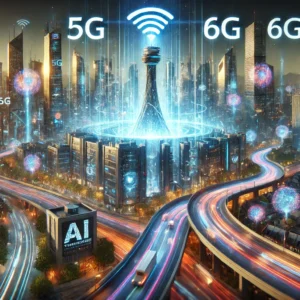
Imagine a future where data travels at unprecedented speeds, security is virtually unbreakable, and global connectivity is redefined by quantum leaps in technology. This is the rise of quantum internet—a revolutionary breakthrough that promises to secure data transmissions and transform the global communication landscape.
In 2025, quantum internet is not just a buzzword but a tangible shift in how we think about digital networks. It combines the principles of quantum mechanics with next-generation communication protocols to enable ultra-secure, ultra-fast, and highly efficient data exchange. Today, we explore how governments, research labs, political debates, business magnates, and everyday citizens are shaping and reacting to this monumental evolution.
Quantum Internet: A Glimpse into Tomorrow’s Networks
Quantum internet harnesses the weird and wonderful properties of quantum physics—like superposition and entanglement—to transmit information. Unlike classical internet, where data is sent as bits (0s and 1s), quantum networks use quantum bits or qubits that can exist in multiple states simultaneously. This not only speeds up data transmission but also offers unparalleled security, as any attempt to eavesdrop on quantum communications instantly disrupts the delicate quantum state, alerting users to potential breaches.
Key Features of Quantum Internet
- Unbreakable Security: Thanks to quantum encryption methods like quantum key distribution (QKD), data is inherently secure against hacking.
- Ultra-Fast Data Transfer: Qubits can process and transmit information at speeds that dwarf conventional systems.
- Global Connectivity: Quantum networks promise seamless connectivity between continents, enabling near-instantaneous communication.
Government Initiatives and Policy Frameworks
Governments around the globe are investing heavily in quantum technologies as part of their national security and innovation strategies. For instance, the United States recently announced a multi-billion-dollar quantum initiative aimed at accelerating the development of quantum internet infrastructure. This program is designed to protect critical data and bolster national defense capabilities while fostering innovation in the private sector.
Similarly, the European Union has rolled out its Quantum Flagship project, which is a 10-year, €1 billion initiative to spearhead quantum research and create a robust framework for quantum communications across member states. These policies are often accompanied by strict regulatory measures to ensure that quantum networks are not only efficient but also secure and ethically governed.
Political debates also echo these themes. In recent parliamentary sessions, lawmakers have discussed the dual-edged sword of quantum internet—balancing its massive potential against concerns over surveillance and data privacy. The conversation is lively and complex: while some argue that quantum networks will usher in a new era of digital freedom, others warn that the same technologies could empower authoritarian regimes if misused.
For further insights, check out Quantum Initiatives by the EU and US Quantum Initiative Act.
Research Labs and Scientific Breakthroughs
At the heart of the quantum internet revolution are research labs and pioneering scientists pushing the boundaries of what’s possible. Leading universities and private research institutions worldwide are collaborating on projects that explore everything from quantum repeaters to error-correction algorithms for qubits.
A groundbreaking study published in Nature recently demonstrated a prototype quantum network spanning over 200 kilometers. Researchers employed entangled photons to securely transmit data, showcasing a practical application of quantum mechanics in real-world communication. Such experiments are critical—they provide the blueprints for future quantum networks and validate theoretical models that have long promised to redefine digital connectivity.
Notably, research collaborations between institutions in China, the US, and Europe are accelerating progress. For example, Chinese scientists successfully connected several cities using a quantum satellite, marking a historic milestone in global quantum communications. The findings are detailed on platforms like Nature Quantum Communication.
These breakthroughs are setting the stage for commercial quantum networks that could soon serve as the backbone for secure global communications.
Celebrity, Sports, and Business Perspectives
It’s not just scientists and policymakers who are talking about the quantum internet—celebrities, sports stars, and top business leaders are also joining the conversation. High-profile tech evangelists have taken to social media to express their excitement about the quantum revolution, often highlighting its potential to secure personal data and revolutionize digital entertainment.
A famous actor recently commented on Twitter that “Quantum internet will change how we experience the digital world—think unhackable streaming and secure video calls!” Similarly, influential sports figures have begun endorsing blockchain-based platforms that integrate quantum security to protect athlete data and sponsorship deals. These endorsements are not only marketing gold but also underscore the broad appeal and transformative potential of quantum networks.
Business leaders, especially those from Silicon Valley, see quantum internet as the next frontier in digital innovation. Top executives have forecasted that quantum communications could unlock a multi-trillion-dollar market by 2030. Venture capital is flowing into startups focused on quantum encryption, and established companies are pivoting their R&D efforts to include quantum computing and network technologies. Financial analysts report that the global quantum technology market could grow at a compound annual growth rate (CAGR) of over 30% in the next decade.
For more insights on business trends, refer to TechCrunch’s Quantum Coverage and Forbes on Quantum Investments.
Intergenerational Perspectives: Bridging Experience and Innovation
Wisdom from the Older Generation
For many older adults, the promise of quantum internet stirs a mix of wonder and cautious optimism. Those who witnessed the dawn of the digital age recall the excitement of early internet days, yet they also remember the challenges of adapting to rapid technological change. They appreciate the potential of quantum networks to provide secure, reliable communications—especially in an era where cyber threats are a constant concern. However, they also voice concerns over the complexities of quantum technology and the possibility of creating an even wider digital divide.
The Zeal of Youth
In stark contrast, younger generations—digital natives who grew up with smartphones and high-speed internet—embrace the quantum leap with enthusiasm. For them, quantum internet is not just an incremental upgrade but a revolutionary change that will redefine how they interact with technology. Social media buzzes with discussions about quantum breakthroughs, and tech influencers are quick to adopt the latest quantum-secure apps. This tech-savvy cohort is eager to leverage the benefits of quantum networks, from enhanced online gaming to unhackable financial transactions.
The dynamic interplay between the cautious wisdom of older generations and the relentless optimism of youth underscores a crucial point: the success of quantum internet will depend not only on technological breakthroughs but also on creating inclusive systems that serve all segments of society.
Social and Cultural Impact
The advent of quantum internet is set to reshape not just our digital interactions but also our social fabric. Imagine a world where your personal data is secured by the very laws of physics—a promise that resonates deeply in today’s era of frequent data breaches and cyberattacks. In urban areas, quantum networks could facilitate smart city initiatives, enabling everything from intelligent traffic management to environmentally optimized energy grids.
On the cultural front, quantum internet might redefine privacy norms. With quantum encryption, individuals can feel more secure about their online identities, which could lead to a more open and innovative digital culture. However, this shift also raises ethical questions about surveillance, consent, and control over personal information. Public debates on these issues are intensifying, with community leaders and privacy advocates urging transparent policies that balance innovation with individual rights.
Community forums and public consultations are increasingly common in cities pioneering quantum technologies. These gatherings allow citizens to voice concerns, share ideas, and contribute to shaping the future of digital connectivity in a way that respects diverse viewpoints.
Economic Boom: Global Business and Revenue Projections
The quantum internet revolution is poised to unlock enormous economic value. As countries and corporations invest in quantum technologies, new industries are emerging, and traditional sectors are being transformed. For example, financial institutions are exploring quantum encryption to secure transactions, while healthcare providers see potential in quantum-enabled telemedicine for safeguarding sensitive patient data.
The global market for quantum technologies is expected to skyrocket in the coming years. Analysts forecast that by 2030, the quantum industry could generate revenues exceeding $10 trillion, with quantum communications playing a pivotal role in that growth. Major cities like New York, London, and Tokyo are positioning themselves as hubs for quantum innovation, attracting investment from venture capitalists, multinational corporations, and government agencies alike.
Key investment drivers include:
- Innovation in Security: With cybercrime costs expected to reach $10.5 trillion annually by 2025, the need for quantum-secure communications is more pressing than ever.
- Government Funding: Programs such as the U.S. Quantum Initiative and the EU’s Quantum Flagship are funneling billions into research and development.
- Private Sector Investments: Technology giants and startups are pouring resources into quantum R&D, seeing it as the next major technological frontier.
For additional economic analysis, consult reports from McKinsey on Quantum Technologies and Deloitte’s Quantum Insights.
Milestones and Future Timelines
The timeline for the quantum internet is as ambitious as it is transformative. Several key milestones mark the progress of this emerging technology:
- 2022-2023: Early prototypes and pilot projects, such as quantum networks connecting regional nodes in select cities, have begun testing the feasibility of long-distance quantum communications.
- 2024: Significant progress is expected as governments and corporations roll out initial commercial applications. Major cities are slated to launch quantum-secure communication trials in critical infrastructure sectors.
- 2025: Marked as a pivotal year, 2025 is anticipated to witness the integration of quantum internet in both public and private networks. Policy updates, international collaborations, and landmark research breakthroughs are projected during this period.
- 2030 and Beyond: The full deployment of global quantum networks, connecting continents and revolutionizing digital communications, is forecast to take shape by 2030, fundamentally altering how we interact in a hyper-connected world.
These milestones are supported by ongoing research and government roadmaps, providing a realistic trajectory for the widespread adoption of quantum internet.
Behind the Technology: How Does Quantum Internet Work?
Understanding quantum internet requires a dive into quantum mechanics. Unlike classical data transmission that uses bits, quantum internet uses qubits—quantum bits that can exist in multiple states simultaneously. This allows for massive parallel processing and inherently secure data transfer via quantum key distribution (QKD).
QKD is particularly revolutionary; it leverages the principle of quantum entanglement where two particles become linked, and any measurement on one immediately affects the other, regardless of the distance. This ensures that any attempt to intercept the data would immediately be detected, making the system virtually immune to hacking.
In addition, quantum repeaters—devices that extend the range of quantum communications—are under active development. These devices are critical for overcoming the inherent limitations of quantum signals over long distances, enabling the creation of a global quantum network.
Real-World Applications and Use Cases
National Security and Government Communications
Quantum internet offers unparalleled security, which is crucial for government communications. Defense and intelligence agencies are investing in quantum networks to protect sensitive information from cyber espionage. Secure data channels, powered by quantum encryption, ensure that classified information remains confidential, even in the face of sophisticated cyber attacks.
Financial Services and Secure Transactions
Banks and financial institutions are among the first to adopt quantum-secure communications. With cyber threats becoming increasingly sophisticated, quantum encryption offers a robust solution to safeguard transactions, customer data, and proprietary financial algorithms. Several major banks are already piloting quantum-secure networks to protect international transfers and trading operations.
Healthcare and Telemedicine
In the healthcare sector, protecting patient data is paramount. Quantum internet can enhance telemedicine platforms by providing secure channels for transmitting sensitive health information. This is particularly important as the healthcare industry moves toward remote patient monitoring and digital diagnostics, ensuring that personal health records remain uncompromised.
Global Business and Industrial Applications
Businesses are leveraging quantum internet to streamline operations and secure intellectual property. For multinational corporations, quantum-secure communications facilitate seamless collaboration across borders while ensuring that trade secrets and proprietary data are shielded from industrial espionage. This has significant implications for sectors like manufacturing, logistics, and research and development.
Smart Cities and IoT Networks
The principles of quantum communication are also being explored in the context of smart cities. As urban environments become increasingly interconnected, quantum internet can provide the secure backbone needed for IoT networks that manage everything from traffic systems to energy grids. This ensures that critical infrastructure remains resilient against cyber threats.
Voices from Across the Spectrum
Celebrity Endorsements and Business Leaders
Influential voices in entertainment and business are starting to champion the rise of quantum internet. Prominent tech innovators and celebrities alike have expressed their belief that quantum networks will redefine digital security and connectivity. Business magnates predict that quantum technologies will drive the next wave of digital transformation, potentially leading to a multi-trillion-dollar market. Their endorsements help generate public interest and foster investment, accelerating the commercialization of quantum technologies.
Perspectives from Older Generations
Older individuals, who have witnessed the evolution from analog to digital, often express a blend of nostalgia and cautious optimism about quantum internet. They recall earlier technological milestones with wonder and are hopeful that quantum networks will address today’s security challenges. Yet, they also urge that as we embrace these advanced systems, it’s essential to safeguard privacy and ensure that technological progress does not marginalize those less comfortable with rapid change.
Youth and Digital Natives
For the younger generation, quantum internet represents the pinnacle of digital evolution. Raised in a world of high-speed internet and constant connectivity, millennials and Gen Z view quantum advancements as natural progressions. They are excited by the prospect of ultra-secure communications, enhanced gaming experiences, and unprecedented data speeds. Social media platforms buzz with discussions about quantum breakthroughs, and tech-savvy youth are eager to adopt quantum-secure applications in their daily lives.
The Road Ahead: Challenges and Opportunities
Despite its vast potential, the path to a fully operational quantum internet is fraught with challenges. Technical hurdles such as qubit coherence, error correction, and scalable quantum repeaters remain significant obstacles. Additionally, the massive infrastructure overhaul required to integrate quantum networks with existing systems poses logistical and economic challenges.
On the regulatory front, international cooperation is crucial. As countries race to establish quantum capabilities, aligning global standards and cybersecurity protocols will be key to ensuring that quantum internet is both secure and interoperable across borders.
Yet, with challenges come opportunities. The ongoing investments from governments, private enterprises, and research institutions signal strong confidence in quantum technologies. As breakthroughs continue to emerge, the long-term benefits—ranging from unbreakable security to unprecedented communication speeds—make the pursuit of quantum internet a worthy endeavor.
FAQs
Q1: What is quantum internet?
A: Quantum internet refers to a communication network that uses quantum bits (qubits) and quantum principles, such as entanglement and superposition, to achieve ultra-secure and ultra-fast data transmission.
Q2: How does quantum key distribution (QKD) work?
A: QKD leverages quantum mechanics to distribute encryption keys securely. Any eavesdropping attempt disturbs the quantum state, alerting users to potential security breaches.
Q3: What are the major applications of quantum internet?
A: Key applications include secure government communications, financial transactions, healthcare data protection, global business operations, and smart city infrastructure.
Q4: Which governments are investing in quantum technologies?
A: Governments in the U.S., European Union, China, and several other countries are heavily investing in quantum research and development to secure their national communications and drive technological innovation.
Q5: What challenges remain in deploying quantum internet globally?
A: Challenges include technical issues like maintaining qubit coherence, developing scalable quantum repeaters, and creating unified regulatory frameworks for international cooperation.
Final Thoughts
The rise of quantum internet marks a pivotal moment in our digital evolution, heralding a future where data is not only transmitted faster than ever but secured by the very laws of physics. As we navigate the complex interplay of technological innovation, government policies, political debates, and diverse societal perspectives, one thing is clear: the quantum revolution is here to redefine global connectivity.
From groundbreaking research labs to high-stakes political arenas, quantum internet is captivating minds and reshaping industries. Celebrities, business leaders, and everyday citizens alike are beginning to appreciate its profound potential. The technology promises to bridge gaps, create new economic opportunities, and ensure that our most sensitive information remains protected in an increasingly interconnected world.
Yet, with this promise come significant challenges. Overcoming technical hurdles and establishing global standards will require cooperation, substantial investment, and a balanced approach that respects both innovation and individual privacy. As we stand on the threshold of a quantum-enabled future, the path ahead is as exhilarating as it is uncertain—a true testament to the power of human ingenuity and the relentless pursuit of progress.
Whether you’re a tech enthusiast, a policymaker, or simply curious about the future of digital security, the journey toward quantum internet offers a captivating glimpse into what tomorrow may hold. Stay informed, stay secure, and join us in embracing a future where connectivity and security are intertwined in ways we’re only beginning to imagine.
For more in-depth analysis and updates on quantum technologies, check out trusted resources like Nature Quantum Communication, IEEE Spectrum, and MIT Technology Review.
By weaving together insights from government policies, cutting-edge research, dynamic political debates, and voices across generations, this article captures the multifaceted landscape of the quantum internet revolution. As we move forward, the quantum leap in global connectivity promises to secure our data, empower industries, and ultimately, transform the way we communicate on a global scale. Embrace the revolution—quantum internet is the future, and that future is arriving faster than we ever imagined.






